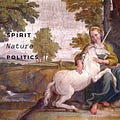Spirit, Nature and Politics
An introduction to this Special Editon that goes out on Friday, with contributions from James Bundy Cllr, Dr Stephen Watt and Professor John Milbank on how as Catholics we can engage in public debate.
The Virgin and the Unicorn, by Domenico Zampieri (Domenichino), fresco, 1604–05.
We seem to daily be witnesses to what some call the culture war, and as Catholics we can feel at the front line of it. The debate about Abortion, Trans-Rights, physician assisted dying, gender and race are all happening before us at a pace that is difficult to keep up with - let alone answer. When we do answer it can be as if we are speaking in a different language and in someways we are. How Christians have answered questions like these over the last century have differed - some like in the US were able to capture a political party. The Evangelical Right is a powerful coalition that has been able to make significant change through the motivation of a dynamic and active electoral force. It was an American Christian response to the growing liberalism of the 60’s and 70’s and although the demographic is changing in the States - it remains an awesome force in elections. Christians in the UK have not been able to or have sought to do this - it seems in many ways there has been an acceptance of secularism and the enlightment idea of the division between private and public spheres. There are notable groups of course who lobby for the rights of unborn children and against the legislation for assisted dying for instance - however there are no significant political movements that can act as a voice for us.
Because of the all pervasiveness of secular and liberal ideas some have advocated a more withdrawn approach. The Benedict Option by Rod Dreher argued for a retrenchment of Christian communities, ‘creating intentional communities in a post-Christian world’ that act as a safe harbour for Christians in which they can stand firm against the ideas and values of our age. It advocates Christians seeking each other out, living near one another, educating their kids together even employing one another. It states on its website it is not about retreatism but providing an alternative to the World and hence being a witness to it.
In the Catholic world you find the concept of Catholic Integralism. To quote from their website:
Catholic Integralism is a tradition of thought that, rejecting the liberal separation of politics from concern with the end of human life, holds that political rule must order man to his final goal. Since, however, man has both a temporal and an eternal end, integralism holds that there are two powers that rule him: a temporal power and a spiritual power. And since man’s temporal end is subordinated to his eternal end, the temporal power must be subordinated to the spiritual power.
This idea of political engagement very much upends the enlighment and Romantic ideas that Europe, the UK, US and others have lived in for the last two or three centuries.
The drive behind this feature starts in that place - looking at how we frame our engagement in the public sphere and how we might go forward confidently and refreshed.
This Special Edition is not advocating one of these options over another but wants to take a step back and look at how we are going about our dialogue with our friends and neigbours. Are we ourselves stuck in the ideas of the enlightment that brought a divorce between faith and… Science, politics, education etc? When we speak to our non-believing friends and family about all these important issues what is our framework? Do we recognise the world-view in which they inhabit and can we witness to them a new and renewed vision that the Kingdom of God brought? This edition seeks to answer some of these questions or at least point the way for deeper reflection:
James Bundy Cllr talks about how as Catholics we should be confident and knowledgable about what the Church teaches on various social and political issues of our day - recognising the deep good our faith brings to discourse and policy, whilst being able to listen to opposing views.
Dr Stephen Watt writes about how we need to present Catholic Social Teaching in a refreshed and nuanced way, re-establishing once again its foundations - Jesus Christ and his Kingdom.
Professor John Milbank argues for a new spiritual politics that seeks to destroy this dividing line of faith and other. He shows us modern politics has become a control over nature (including our own bodies) it sees as meaningless and self-contained - to be exploited and used rather than how it may be ‘fulfilled as beautiful and therefore as also true and good’.
The featured articles will be emailed out to you on Friday, but I thought his might be a good introduction in a timely manner to allow you to reflect. Regardless of whether we are involved in party politics or are active in a single-issue cause we all live out in the world, we all interact with people who do not share our beliefs, beliefs that can cause barriers to be erected and misunderstandings abound.
Eric Hanna - Editor.


